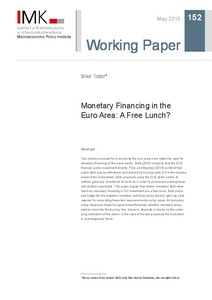Monetary financing in the euro area: a free lunch?
"Two recent proposals for overcoming the euro area crisis make the case for monetary financing of the public sector. Watt (2015) proposes that the ECB finances public investment directly, Pâris and Wyplosz (2014) contend that public debt may be effectively restructured by burying parts of it in...
| Main Author: | |
|---|---|
| Institution: | ETUI-European Trade Union Institute |
| Format: | TEXT |
| Language: | English |
| Published: |
Düsseldorf
2015
IMK |
| Subjects: | |
| Online Access: | https://www.labourline.org/KENTIKA-19112692124919308749-Monetary-financing-in-the-euro.htm |
| Summary: | "Two recent proposals for overcoming the euro area crisis make the case for monetary financing of the public sector. Watt (2015) proposes that the ECB finances public investment directly, Pâris and Wyplosz (2014) contend that public debt may be effectively restructured by burying parts of it in the balance sheet of the Eurosystem. Both proposals place the ECB at the center of matters generally considered to be fiscal in order to circumvent existing fiscal and political constraints. This paper argues that neither monetary debt retirement nor monetary financing of EU investment are a free lunch. Both proposals fudge the line between monetary and fiscal policy thereby ignoring valid reasons for separating these two macroeconomic policy areas. All monetary policy measures impact on government finances; whether monetary policy actions cross the fiscal policy line, however, depends primarily on the underlying motivation of the action. In the case of the two proposals the motivation is unambiguously fiscal." |
|---|---|
| Physical Description: | 12 p. Digital |

